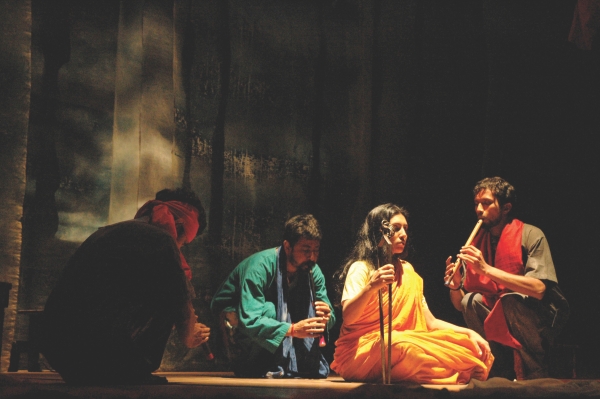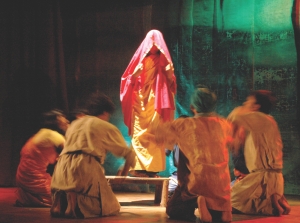| Home - Back Issues - The Team - Contact Us |
 |
| Volume 10 |Issue 41 | October 28, 2011 | |
|
|
Theatre
Can the Subaltern Act? Sushmita S Preetha Forty years ago, in the newly independent Bangladesh, for a woman to participate in theatre was itself an act of subversion. Theatre was the most public of art forms that a woman of an urban middle-class Bengali family could engage in. It was also, in many ways, the most rebellious of professions she could choose, for her involvement and presence in the world of theatre inevitably challenged bourgeois codes of female propriety. In addition, she had to struggle to make a space for herself in the world of theatre, which, no matter how progressive it might have seemed to the outsider, was still a predominantly patriarchal institution. Forty years later, how different really is the scenario for the young “liberated” Bangladeshi woman? After all, she has more freedom, resources and opportunities than the generations before her. Marriage isn't the only viable life option anymore (even if it is still the most preferable one!) and she is slowly but surely reclaiming spaces from which she was previously excluded. One would think, then, that the theatre actor of today encounters a totally different experience than her elder colleagues, unshackled as she is from traditional patriarchal values and narrow mindsets. But in reality have things really changed that much? Despite the fact that there are more and more women entering different professions and confronting hitherto accepted notions of what is and isn't respectable for women to do, theatre still remains a profession that is frowned upon by mainstream society. Many women are discouraged by their families from joining theatre. Working in theatre involves rehearsals that might go on till late in the evenings and interactions with male colleagues on a regular basis. Tamanna Rahman, 21, has always wanted to act in theatre, and although she dabbled in acting when she was younger, playing female leads during her school and college years, her family put their foot down when she expressed a desire to work in theatre. She says, “My parents have always known how much I love acting. But when I told them that I wanted to do theatre seriously, that I wanted to join a group, they immediately said no. They said it was inappropriate for a young girl from our family background to be involved in theatre.” Tamanna thinks that she might have been able to persuade her parents had it not been for their parent's fear of 'what would people say' and 'who would marry her?' “My parents are simple people, and they want me to be happy, but there is so much negativity in our society regarding women in theatre. People would come and tell them constantly: how can you let your daughter do that?” Tamanna comments. There are, of course, families that are supportive and nurture their daughters' talents and passion for theatre. But when the daughter reaches a marriageable age, many parents find themselves worrying about how acceptable their daughter's profession might be to her in-laws. Rahnuma Haque, mother of a 27 year old theatre activist, says, “I've always been supportive of my daughter's dreams. I want her to have her own identity. But lately, I've been a little concerned about the future. Every proposal I have gotten for her demands that she quit theatre after marriage. I don't want her to give up everything she has done in her life to be married, but at the same time, I wonder if we will find someone who is understanding and liberal enough to allow her to pursue her dreams.” Many young aspiring women do find themselves having to give up theatre once they get married. Even when their husbands and in-laws are encouraging, many women find it difficult to find a balance between her hectic, irregular work hours and domestic life. If she has a child, and takes a break for two or three years, her career is all but over.
Apart from family restrictions, there are other practical limitations that women face in doing theatre. Tamzida Mohsin Tuba, a student of Drama and Dramatics department of Jahangirnagar University, says, “All the gates of the halls are closed by 9pm. Most of the rehearsals have to be scheduled in the evening, so how can we go back to our dorms in time?” As a result of such practical and social constraints, women often find themselves having to take a backseat within their own theatre groups. Reetu Sattar from Prachyanat has been involved in theatre for over a decade now. She says, “Doing theatre doesn't just involve acting, you need to do a lot of legwork. You have to put up posters at night, you have to contact the press, you have to run errands, and it's almost always the men who do that. It's the men who do the heavy backstage work, so naturally they are valued differently within the group than their female colleagues.” Sattar explains that women, too, are usually not interested in taking a lead when it comes to production managing or working backstage. However, an increasing number of women are now working in set and costume designing, prop management or production management. Prajna Tasnuva Rubayyat, a young and promising theatre activist who prefers to work off rather than on stage, says, “There are lots of women who work backstage these days, but the heavy work is still done by men. People still think that a woman would not be able to put the same kind of effort or hard work as a man. It's always the men who take the responsibility of doing something difficult. Intentionally or otherwise, they seem to suggest that because we are women, we should do something easier and let them handle the strenuous tasks.” Sattar and Rubayyat both feel that women can be active and take responsibility offstage, but that because it has always been a male-dominated space, women often shy away from taking charge. Sara Zaker, prominent theatre actor and TV personality, believes that there is a complex dynamic between men and women within any particular theatre group. “Group theatre is like being in a family,” she explains. “Within the group, a senior woman has a lot of influence, but like in a family, her contribution isn't seen or cannot really be seen outside. You don't see them on the stage taking a lead in the management side of things.” Zaker argues that women should have a more visible role within the groups: “Don't we talk about women's empowerment and how it is very important? In that sense, women in theatre aren't as empowered as they could be. The situation hasn't allowed for women to grow, and women, too, have not been too interested. They do make decisions, but you don't see them calling the shots.”
When it comes to the administrative side of theatre, women are still lagging behind. Rokeya Rafique Baby, prolific theatre actor and social activist, is one of a handful of women in Dhaka to lead her own theatre group. She comments, “When it comes to representing a group, it's almost always a man who is the spokesperson. In the Group Theatre Federation, which overlooks the work of all theatre groups in Bangladesh, women's participation is negligible. It's really sad that there are no women in senior decision-making positions.” Rafique thinks that it's important that women excel at the creative aspect of theatre work, but at the same time, they must not be excluded from decision-making processes if we are to challenge and change theatre as a patriarchal institution. From a creative aspect, Rafique, Zaker and Sattar all feel that one of the primary reasons there aren't a greater number of women in their field is because theatre, in general, is a marginalised art form in Bangladesh today. As such, theatre artists often do not get the same amount of recognition, money or acknowledgement as other contemporary artists and performers. Many talented female actors do come into theatre, but leave once they realise that a career in electronic media is more promising. Only the most dedicated of actors continue to do theatre even when they receive very little remuneration or mainstream recognition for it. Legendary actors like Ferdousi Majumdar and Shimul Yusuf are examples of such life-long dedication although not too many female actors have followed their footsteps yet. Of course, there are strong female voices and role models in theatre. There are highly talented women directors, scriptwriters, actors, production managers and so on, who have pushed the boundaries of conventional theatre and demanded that they be taken seriously. Having said that, women still have to struggle, both within their families and outside of it, to pursue theatre as a sustainable career and life choice. Theatre, as an institution and an art form, still hasn't been able to rid itself of its patriarchal hues. But progress is being made with each generation of brave and talented women who refuse to be ignored, sidelined or excluded.
Copyright
(R) thedailystar.net 2011 |
||


